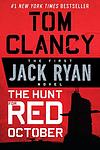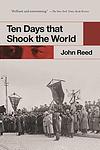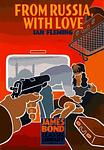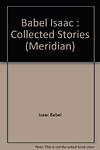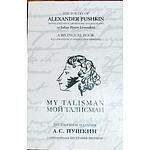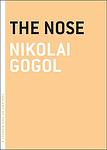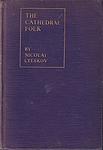The Greatest "Russia" Books of All Time
Click to learn how this list is calculated.
This list represents a comprehensive and trusted collection of the greatest books. Developed through a specialized algorithm, it brings together 300 'best of' book lists to form a definitive guide to the world's most acclaimed books. For those interested in how these books are chosen, additional details can be found on the rankings page.
Genres
The category of "Russia" in books typically encompasses literature that explores the history, culture, politics, and society of Russia. This can include works of fiction, non-fiction, memoirs, and biographies that delve into the complexities of Russian life, from the tsars and the Soviet era to contemporary Russia. These books may also examine the country's relationship with other nations, its artistic and literary traditions, and its impact on global events. Overall, the category of "Russia" offers a rich and diverse range of books that provide insight into one of the world's most fascinating and complex nations.
Countries
Date Range
Reading Statistics
Click the button below to see how many of these books you've read!
Download
If you're interested in downloading this list as a CSV file for use in a spreadsheet application, you can easily do so by clicking the button below. Please note that to ensure a manageable file size and faster download, the CSV will include details for only the first 500 books.
Download-
26. The Origins of Totalitarianism by Hannah Arendt
The book explores the roots of totalitarian systems, particularly focusing on Nazi Germany and Stalinist Russia. It delves into the historical, social, and political circumstances that led to the rise of these oppressive regimes, including anti-Semitism, imperialism, and the decline of the nation-state. The author further discusses the nature of power, the role of propaganda, and the manipulation of the masses in these systems, providing a comprehensive analysis of totalitarianism.
-
27. Three Sisters by Anton Chekhov
"Three Sisters" is a play that revolves around the lives of three sisters, Olga, Masha, and Irina, who live in a provincial Russian town and yearn for their former life in Moscow. The story explores their relationships, dreams, and disappointments, as well as their interactions with the military officers stationed nearby. The narrative is a poignant exploration of love, loss, and the relentless passage of time, highlighting the human struggle for meaning and happiness.
-
28. And Quiet Flows The Don by Mikhail Sholokhov
"And Quiet Flows The Don" is a sweeping epic set in the early 20th century, following the lives of several characters in the Don River region of Russia. Through the lens of the Melekhov family, the novel explores the impact of war, revolution, and societal changes on both individuals and the community as a whole. With vivid descriptions and rich character development, the book delves into themes of love, loyalty, and the struggle for survival amidst the tumultuous backdrop of historical events.
-
29. The Case of Comrade Tulayev by Victor Serge
"The Case of Comrade Tulayev" is a political novel set in the Stalinist era of the Soviet Union. The story begins with the murder of a high-ranking Soviet official, Comrade Tulayev, which sets off a series of events leading to the arrest and execution of innocent people. It provides an in-depth exploration of the paranoia, fear, and injustice that characterized Stalin's regime, showing the human cost of political purges and the absurdity of the bureaucratic system.
-
30. The Passion by Jeanette Winterson
"The Passion" is a historical novel set during the Napoleonic Wars and told from the perspectives of two unique characters: a French soldier who serves in Napoleon’s army and a Venetian woman with webbed feet who works as a casino worker. The narrative explores themes of love, passion, identity, and fate as the two characters' lives intertwine in unexpected ways. The book is renowned for its magical realism and lyrical prose, offering a poetic exploration of human desire and the nature of love.
-
31. The Hunt for Red October by Tom Clancy
This novel details the story of a high-ranking Russian submarine captain who aims to defect to the United States without sparking a war between the two nations. The American government, upon receiving information about the captain's intentions, sends its best analyst to aid in the successful defection of the captain and his crew. The novel is a thrilling tale of espionage, filled with suspense and detailed technical descriptions of military technology and procedure.
-
32. Kolyma Stories by Varlam Shalamov
"Kolyma Stories" is a collection of short stories that vividly depict the harrowing experiences of prisoners in the Soviet Gulag during the Stalinist era. Written by Varlam Shalamov, a survivor of the Kolyma labor camps himself, the book offers a raw and unflinching portrayal of the inhumane conditions, extreme suffering, and moral degradation endured by the prisoners. Through his powerful and haunting narratives, Shalamov sheds light on the resilience of the human spirit and the indomitable will to survive amidst unimaginable cruelty.
-
33. Cancer Ward by Aleksandr Solzhenitsyn
"Cancer Ward" is a poignant novel set in a Soviet cancer hospital in the mid-1950s. It follows the lives and struggles of patients and doctors, exploring their personal histories, relationships, and the political environment of the time. The hospital serves as a metaphor for the oppressive Soviet state, with cancer symbolizing the malignant growth of totalitarianism. The book also explores themes of mortality, the human spirit, and the will to survive.
-
34. Petersburg by Andrei Bely
"Petersburg" is a symbolist novel set in the heart of Russia during the 1905 Revolution. It follows the story of a young man who is given the task of assassinating his own father, a high-ranking government official, by a radical political group. The narrative is a complex mix of politics, family drama, and philosophical introspection, all set against the backdrop of a city in turmoil. The novel is renowned for its vivid and poetic descriptions of the city itself, making Petersburg as much a character in the story as the people who inhabit it.
-
35. The Great Railway Bazaar by Paul Theroux
"The Great Railway Bazaar" is a travelogue in which the author embarks on a four-month journey by train from London through Europe, the Middle East, the Indian subcontinent, Southeast Asia, and Siberia, and then back to Europe. The book is a vivid and insightful account of the people, cultures, landscapes, and experiences encountered during the journey, painting a unique picture of the world as seen from the perspective of a train window. The author's sharp observations and engaging storytelling make this journey as much an inner exploration as a geographical one.
-
36. Ten Days That Shook the World by John Reed
This book provides a firsthand account of the Russian Revolution in 1917, specifically focusing on the ten days during which the Bolsheviks seized power. The author, an American journalist, presents a detailed chronicle of the events, people, and emotions during this tumultuous period. His narrative is filled with vivid descriptions and passionate portrayals of the revolutionaries, offering an intimate look into this significant historical event.
-
37. The Lady with the Dog by Anton Chekhov
"The Lady with the Dog" is a short story that revolves around an adulterous affair between a Russian banker and a young woman he meets while on vacation in Yalta. The narrative explores the protagonists' deepening feelings for each other as they continue their clandestine relationship back in Moscow, struggling with the moral implications of their actions. The story is renowned for its profound character development and exploration of the complexities of illicit love.
-
38. Moscow Petushki by Venedikt Yerofeev
The book is a surreal and satirical narrative that takes the reader on a tragicomic journey aboard a suburban train from Moscow to the small town of Petushki. The protagonist, a disillusioned intellectual and alcoholic, engages in philosophical musings and encounters a variety of eccentric characters, each embodying different aspects of Soviet life. As he delves into ruminations on love, suffering, and the search for meaning amidst the absurdities of existence, the journey becomes a metaphor for the human condition and the societal decay of the USSR, blending dark humor with poignant introspection.
-
39. Gorky Park by Martin Cruz Smith
In the heart of Moscow, three corpses found in Gorky Park lead a dedicated Soviet police investigator on a complex and dangerous trail that entangles him in the web of the KGB and the FBI. As he delves deeper into the case, he uncovers a chilling conspiracy and faces moral dilemmas that challenge his very principles and integrity. The investigation becomes a personal quest for truth that takes him far beyond the park's snowy borders, testing his resolve and putting his life at risk in the shadowy intersections of international espionage and political intrigue.
-
40. From Russia with Love by Ian Fleming
In this thrilling spy novel, British secret agent James Bond is targeted by a Russian intelligence group, who lures him into a trap using a beautiful cipher clerk as bait. The plot thickens as Bond falls for the clerk and must navigate a series of dangerous encounters with Russian operatives, including a deadly face-off with a sadistic killer. The story is a blend of action, suspense, and romance, set against the backdrop of the Cold War.
-
41. Resurrection: A Novel by Leo Tolstoy
"Resurrection: A Novel" is a profound exploration of moral responsibility and the possibility of redemption. The story revolves around a nobleman who, in his youth, seduces and abandons a young servant girl. Years later, he encounters her as a prostitute on trial for murder. Overwhelmed by guilt for his role in her downfall, he decides to atone for his sins by dedicating himself to her defense and rehabilitation. The novel grapples with themes of morality, justice, and the human capacity for change.
-
42. The Collected Stories of Isaac Babel by Isaac Babel
This collection of short stories presents a rich tapestry of narratives exploring the harsh realities of war, the complexities of Jewish life in early 20th century Russia, and the human condition. Written by a renowned Russian author, the stories are known for their vivid imagery, poignant themes, and incisive social commentary. The collection includes famous works like "Red Cavalry", a series of stories based on the author's experiences as a journalist during the Russo-Polish War, and "Odessa Stories", which depicts the vibrant yet often brutal life in the city's Jewish ghetto.
-
43. The Poetry of Alexander Pushkin by Alexander Pushkin
This book is a compilation of the works of a renowned Russian poet, showcasing his lyrical genius and profound understanding of human emotions. The collection includes a variety of his poems, from love sonnets to narrative pieces, reflecting the poet's versatility and depth. His mastery of language and ability to capture the complexities of life and love make this collection a timeless piece of literature.
-
44. The Nose by Nikolai Gogol
"The Nose" is a satirical short story that follows the life of a Russian official whose nose leaves his face and develops a life of its own. The nose transforms into a human and starts living as a higher-ranking official than its original owner. The story unfolds as the official tries to regain his lost nose, only to face numerous absurd and comical situations. The narrative is a critique of the social and bureaucratic conditions of 19th-century Russia.
-
45. The Enchanted Wanderer by Nikolai Leskov
"The Enchanted Wanderer" is a collection of short stories that follow the life of a Russian serf, Ivan Flyagin, who is destined to wander forever and never die. Throughout his travels, he experiences a myriad of adventures including becoming a monk, being captured by Tartars, and falling in love. The stories are filled with folkloric elements and offer a vivid depiction of 19th-century Russian society.
-
46. First Love by Ivan Turgenev
This classic Russian novel explores the intense and passionate first love of a 16-year-old boy named Vladimir. While staying at his family's country estate, he becomes infatuated with a 21-year-old princess named Zinaida. Despite her engagement to another man, Vladimir's youthful ardor and naivety lead him to believe he can win her love. The story is a poignant examination of unrequited love, youthful idealism, and the painful transition into adulthood.
-
47. First Circle by Aleksandr Solzhenitsyn
"First Circle" is a gripping narrative set in a Soviet Union labor camp during the Stalin era, where the prisoners are intellectuals and scientists. The story revolves around these individuals who, despite their grim circumstances, engage in political and philosophical debates, striving to maintain their dignity and humanity. The novel explores themes of morality, corruption, and the human spirit, providing a vivid and harrowing depiction of life under Stalinist rule.
-
48. Mother by Maxim Gorky
This novel centers around a working-class Russian woman who becomes involved in revolutionary activities after witnessing the struggles and injustices faced by her son and his comrades. Despite her initial fear and hesitation, she evolves into a dedicated activist, smuggling illegal literature and participating in strikes. The narrative provides a powerful exploration of the personal and societal transformations brought about by political activism, set against the backdrop of pre-revolutionary Russia.
-
49. The Seagull by Anton Chekhov
The play revolves around the complex interplay of love, art, and the pursuit of happiness among a group of characters gathered at a Russian country estate. Central to the narrative is a young aspiring playwright, who yearns for the recognition of his art and the love of a woman, an actress infatuated with a successful writer. The story unfolds as these characters grapple with unrequited affections, artistic ambitions, and the crushing weight of societal expectations, leading to a tapestry of human desires, disillusionment, and the search for meaning in life.
-
50. The Cathedral Folk by Nikolai Leskov
"The Cathedral Folk" is a novel set in 19th-century Russia, revolving around the lives of the people connected to the construction of a grand cathedral. The narrative delves into the intricacies of Russian society, exploring themes of faith, tradition, and the conflicts between progress and the preservation of the old ways. Through a rich tapestry of characters, including craftsmen, clergy, and local gentry, the book examines the human spirit and the complexities of moral choices in a time of social change, all while painting a vivid picture of Russian provincial life with its unique blend of piety, superstition, and the struggle for personal redemption.
Reading Statistics
Click the button below to see how many of these books you've read!
Download
If you're interested in downloading this list as a CSV file for use in a spreadsheet application, you can easily do so by clicking the button below. Please note that to ensure a manageable file size and faster download, the CSV will include details for only the first 500 books.
Download




